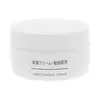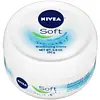What's inside
What's inside
 Key Ingredients
Key Ingredients

 Benefits
Benefits

 Concerns
Concerns

 Ingredients Side-by-side
Ingredients Side-by-side

Water
Skin ConditioningCyclopentasiloxane
EmollientEthylhexyl Palmitate
EmollientDipropylene Glycol
HumectantBehenyl Alcohol
EmollientBeeswax
Emulsion StabilisingGlycerin
HumectantOlea Europaea Fruit Oil
MaskingDimethicone
EmollientGlyceryl Stearate
EmollientPentylene Glycol
Skin ConditioningPentaerythrityl Tetraethylhexanoate
EmollientOctyldodecyl Myristate
EmollientPolysorbate 60
EmulsifyingPEG-75 Stearate
Simmondsia Chinensis Seed Oil
EmollientLimnanthes Alba Seed Oil
Skin ConditioningGlycosyl Trehalose
Emulsion StabilisingHydrogenated Starch Hydrolysate
HumectantAllantoin
Skin ConditioningPolyquaternium-51
Skin ConditioningSus Extract
Skin ConditioningSodium Hyaluronate
HumectantCitrus Grandis Seed Extract
AstringentButylene Glycol
HumectantTocopherol
AntioxidantPhenoxyethanol
PreservativeWater, Cyclopentasiloxane, Ethylhexyl Palmitate, Dipropylene Glycol, Behenyl Alcohol, Beeswax, Glycerin, Olea Europaea Fruit Oil, Dimethicone, Glyceryl Stearate, Pentylene Glycol, Pentaerythrityl Tetraethylhexanoate, Octyldodecyl Myristate, Polysorbate 60, PEG-75 Stearate, Simmondsia Chinensis Seed Oil, Limnanthes Alba Seed Oil, Glycosyl Trehalose, Hydrogenated Starch Hydrolysate, Allantoin, Polyquaternium-51, Sus Extract, Sodium Hyaluronate, Citrus Grandis Seed Extract, Butylene Glycol, Tocopherol, Phenoxyethanol
Water
Skin ConditioningGlycerin
HumectantMyristyl Alcohol
EmollientParaffinum Liquidum
EmollientButylene Glycol
HumectantAlcohol Denat.
AntimicrobialStearic Acid
CleansingPetrolatum
EmollientMyristyl Myristate
EmollientGlyceryl Stearate
EmollientHydrogenated Coco-Glycerides
EmollientDimethicone
EmollientSimmondsia Chinensis Seed Oil
EmollientTocopheryl Acetate
AntioxidantLanolin Alcohol
EmollientPolyglyceryl-2 Caprate
EmulsifyingParfum
MaskingCarbomer
Emulsion StabilisingSodium Hydroxide
BufferingPhenoxyethanol
PreservativeWater, Glycerin, Myristyl Alcohol, Paraffinum Liquidum, Butylene Glycol, Alcohol Denat., Stearic Acid, Petrolatum, Myristyl Myristate, Glyceryl Stearate, Hydrogenated Coco-Glycerides, Dimethicone, Simmondsia Chinensis Seed Oil, Tocopheryl Acetate, Lanolin Alcohol, Polyglyceryl-2 Caprate, Parfum, Carbomer, Sodium Hydroxide, Phenoxyethanol
 Reviews
Reviews

Ingredients Explained
These ingredients are found in both products.
Ingredients higher up in an ingredient list are typically present in a larger amount.
Butylene Glycol (or BG) is used within cosmetic products for a few different reasons:
Overall, Butylene Glycol is a safe and well-rounded ingredient that works well with other ingredients.
Though this ingredient works well with most skin types, some people with sensitive skin may experience a reaction such as allergic rashes, closed comedones, or itchiness.
Learn more about Butylene GlycolDimethicone is a type of synthetic silicone created from natural materials such as quartz.
What it does:
Dimethicone comes in different viscosities:
Depending on the viscosity, dimethicone has different properties.
Ingredients lists don't always show which type is used, so we recommend reaching out to the brand if you have questions about the viscosity.
This ingredient is unlikely to cause irritation because it does not get absorbed into skin. However, people with silicone allergies should be careful about using this ingredient.
Note: Dimethicone may contribute to pilling. This is because it is not oil or water soluble, so pilling may occur when layered with products. When mixed with heavy oils in a formula, the outcome is also quite greasy.
Learn more about DimethiconeGlycerin is already naturally found in your skin. It helps moisturize and protect your skin.
A study from 2016 found glycerin to be more effective as a humectant than AHAs and hyaluronic acid.
As a humectant, it helps the skin stay hydrated by pulling moisture to your skin. The low molecular weight of glycerin allows it to pull moisture into the deeper layers of your skin.
Hydrated skin improves your skin barrier; Your skin barrier helps protect against irritants and bacteria.
Glycerin has also been found to have antimicrobial and antiviral properties. Due to these properties, glycerin is often used in wound and burn treatments.
In cosmetics, glycerin is usually derived from plants such as soybean or palm. However, it can also be sourced from animals, such as tallow or animal fat.
This ingredient is organic, colorless, odorless, and non-toxic.
Glycerin is the name for this ingredient in American English. British English uses Glycerol/Glycerine.
Learn more about GlycerinGlyceryl Stearate is a mix of glycerin and stearic acid.
It is used to stabilize the mixing of water and oil ingredients. By preventing these ingredients from separating, it can help elongate shelf life. It can also help thicken the product's texture.
As an emollient, it helps soften skin and supports barrier-replenishing ingredients.
In cosmetics, Glyceryl Stearate is often made from vegetable oils or synthetically produced.
This ingredient may not be fungal-acne safe
Fun fact: The human body also creates Glyceryl Stearate naturally.
Learn more about Glyceryl StearatePhenoxyethanol is a preservative that has germicide, antimicrobial, and aromatic properties. Studies show that phenoxyethanol can prevent microbial growth. By itself, it has a scent that is similar to that of a rose.
It's often used in formulations along with Caprylyl Glycol to preserve the shelf life of products.
This oil comes from the seeds of the desert shrub called Jojoba. It is more commonly known as jojoba oil, a non-comedogenic oil.
Jojoba oil does not contain fragrance and has many fatty-acids, making it a great soothing ingredient.
It also contains Vitamin E, a great moisturizing ingredient. Vitamin E is also an antioxidant and protects your skin against oxidative damage.
This ingredient humectant properties, meaning it helps draw moisture from the air. This helps keep your skin hydrated.
While jojoba has antibacterial properties, it is only able to kill some strains of bacteria.
Studies also show it helps in wound healing. In fact, Indigenous cultures have used jojoba as a moisturizer and to help treat burns for centuries.
Fun fact: Jojoba oil similar to natural human skin sebum, so it has a great effect on dry skin. It is also promising with helping to regulate sebum production.
Due to its fatty acid content, Jojoba oil may not be fungal acne safe. We recommend speaking with a professional if you have any concerns.
Learn more about Simmondsia Chinensis Seed OilWater. It's the most common cosmetic ingredient of all. You'll usually see it at the top of ingredient lists, meaning that it makes up the largest part of the product.
So why is it so popular? Water most often acts as a solvent - this means that it helps dissolve other ingredients into the formulation.
You'll also recognize water as that liquid we all need to stay alive. If you see this, drink a glass of water. Stay hydrated!
Learn more about Water